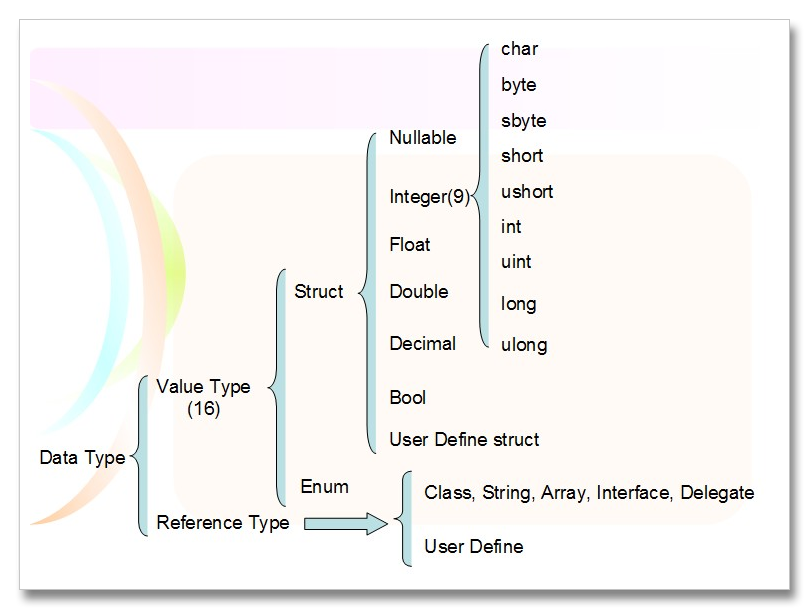C# Data Types
2012-05-21 19:08 libiver 阅读(553) 评论(0) 编辑 收藏 举报声明:欢迎任何人和组织转载本blog中文章,但必须标记文章原始链接和作者信息。
本文链接: http://www.cnblogs.com/leezhm/archive/2012/05/21/2512079.html
开拓进取的小乌龟———->cnBlogs 点滴点点滴滴 Blog
In C-Sharp, there are two general kinds of Build-In Data Types: Value Type and Reference Type.So what is the difference between that two types?In brief, for a value type, a variable holds an actual value, but for a reference type, a variable holds a reference to the value.
We can show all data types used a chart as below .C# defines 16 simple value types and more than 6 reference types.
Do you know what is the relationship between bool and System.Boolean, int and System.Int64? Sometimes you will find this tips “struct System.Boolean Represents a Boolean value.” when we move the cursor on to a bool variable.For example, here is a code snippet that show you how to used typeof and sizeof .
1: Console.WriteLine("{0}\t{1}\t\t{2}", "Type In C#", "Type In .NET", "Meaning");
2: Console.WriteLine("{0}\t\t{1}\t\t{2} bits", "char", typeof(char), sizeof(char) * 8);
3: Console.WriteLine("{0}\t\t{1}\t\t{2} bits", "byte", typeof(byte), sizeof(byte) * 8);
4: Console.WriteLine("{0}\t\t{1}\t\t{2} bits", "sbyte", typeof(sbyte), sizeof(sbyte) * 8);
5: Console.WriteLine("{0}\t\t{1}\t\t{2} bits", "short", typeof(short), sizeof(short) * 8);
6: Console.WriteLine("{0}\t\t{1}\t\t{2} bits", "ushort", typeof(ushort), sizeof(ushort) * 8);
7: Console.WriteLine("{0}\t\t{1}\t\t{2} bits", "int", typeof(int), sizeof(int) * 8);
8: Console.WriteLine("{0}\t\t{1}\t\t{2} bits", "uint", typeof(uint), sizeof(uint) * 8);
9: Console.WriteLine("{0}\t\t{1}\t\t{2} bits", "long", typeof(long), sizeof(long) * 8);
10: Console.WriteLine("{0}\t\t{1}\t\t{2} bits", "ulong", typeof(ulong), sizeof(ulong) * 8);
11: Console.WriteLine("{0}\t\t{1}\t\t{2} bits", "float", typeof(float), sizeof(float) * 8);
12: Console.WriteLine("{0}\t\t{1}\t\t{2} bits", "double", typeof(double), sizeof(double) * 8);
13: Console.WriteLine("{0}\t\t{1}\t\t{2} bits", "decimal", typeof(decimal), sizeof(decimal) * 8);
14: Console.WriteLine("{0}\t\t{1}\t\t{2} bits", "bool", typeof(bool), sizeof(bool) * 8);
15: Console.WriteLine("{0}\t\t{1}\t\t{2} bits", "null", typeof(Nullable), "");
16: Console.WriteLine("{0}\t\t{1}\t\t{2} bits", "enum", typeof(Enum), "");
Run it with “csc.exe example.cs /out example.exe” and you will get the output from the program like below.
Clearly, according to the result, char == System.Char, byte == System.Byte, short == System.Int16 and so on.Type in C-Sharp and Type in .NET are corresponding.
All that types like System.Char, System.Int16 System.Boolean and so on are structs, they will be found on MSDN.So what am I meaning or what can we get basic on those result?Below is the trust.
Ahaha, It is clearly!





